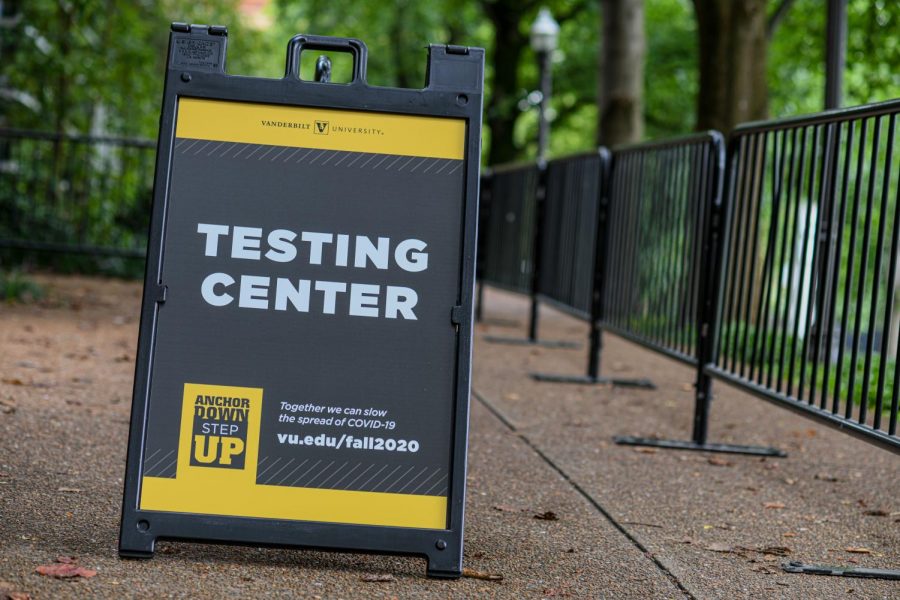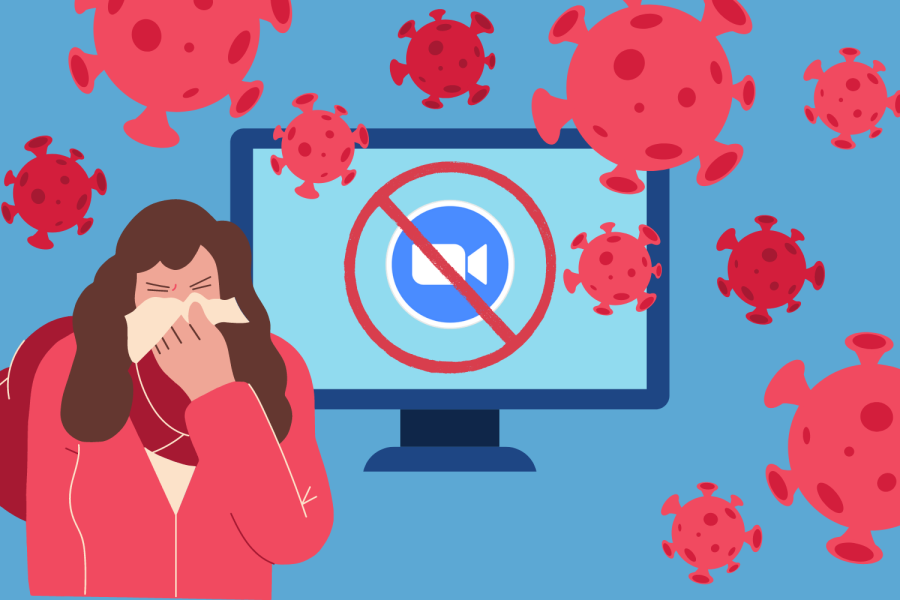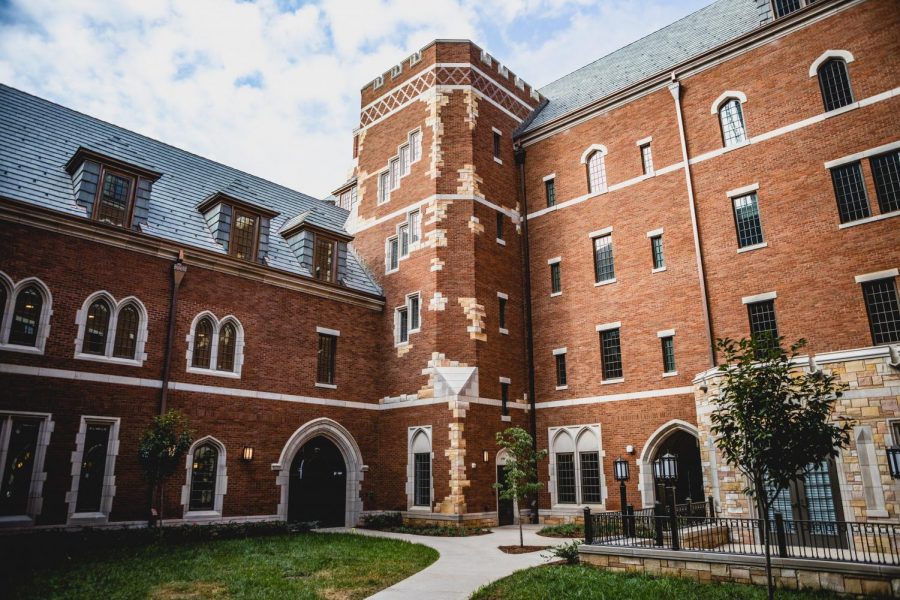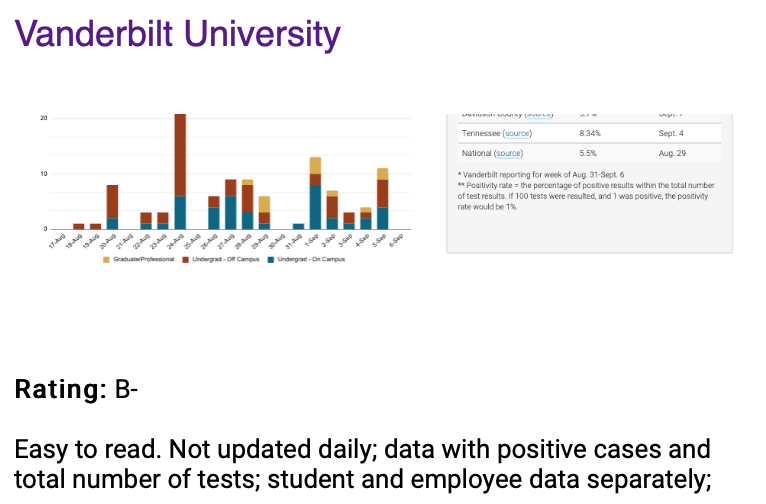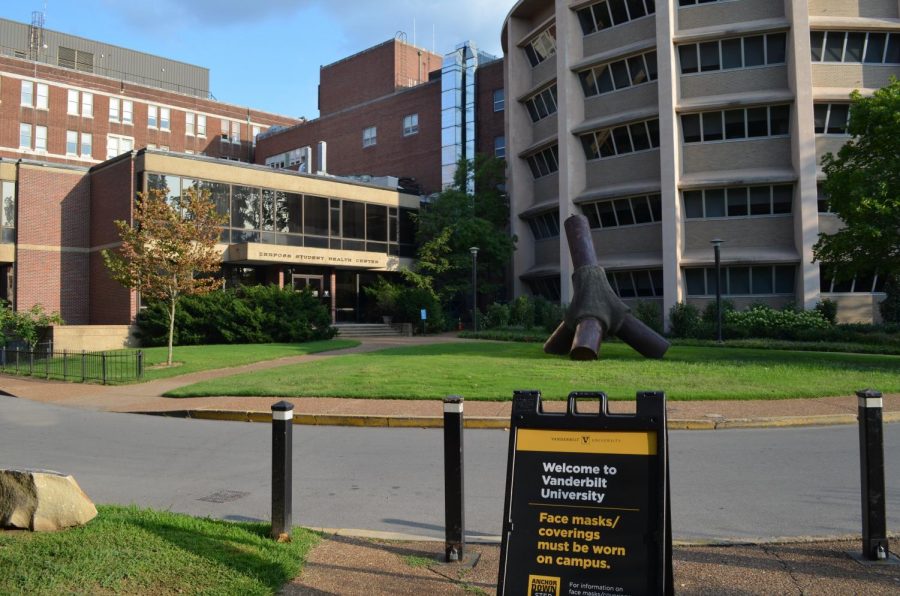Starting on Aug. 31, Vanderbilt expanded its COVID-19 testing efforts beyond pre-arrival and arrival testing to include weekly mandatory testing for all undergraduate students cleared to be on campus.
After the first two weeks, positivity rates were 0.67 percent and 0.46 percent respectively. By contrast, Davidson County’s positivity rate was 6.4 percent as of Sept. 14. When asked if there was a particular trigger that sparked the decision for weekly testing, a university spokesperson said in an email to The Hustler that such measures had already been a part of their approach.
“As we’ve discussed throughout our Return to Campus Plan communications, frequent testing is key to our efforts to slow the spread of COVID-19 on our campus,” the statement from the university read. “Based on the analysis of our public health experts, we believe enhanced weekly testing, paired with our rigorous contact tracing, will provide another key lever in our efforts to prevent the spread of this virus.”
The university has partnered with Vault, a men’s health company, to accomplish weekly on-campus testing. While Vault primarily deals in men’s testosterone treatments and plans, the company has also become a national provider of at-home PCR saliva test kits, the first Food and Drug Administration (FDA) EAU authorized saliva test for COVID-19. According to Vault’s website, the test has a 99 percent accuracy rate for detecting the novel coronavirus, with individual test kits costing $150.
“We chose to use the Vault saliva test for our testing program primarily because it is an extremely sensitive test with an exceedingly low false positive rate as compared to other tests on the market,” the statement continued. “As is customary with most business arrangements, the details of our contract with Vault are confidential.”
While Vanderbilt students’ only engagement with Vault concerns COVID-19 testing, some students received an email from the company about male fertility after registering their pre-arrival saliva tests. The email, with a subject line reading “5 ways to potentially increase your sperm count,” was identified by Vault as an error within a few hours of its distribution on Aug. 16. Students who erroneously received the email, such as first-year Arthur Hahn, were assured that their email addresses were removed from all lists concerning men’s health content.
“We know that you came to Vault for COVID-19 testing services and, in providing us with your email address, you did not expect to receive any communications of this type,” a Vault Health representative said in an email. “I fully acknowledged that you received this message in error, and I sincerely apologize for this miscommunication.”
All students returning to campus for in-person instruction were required to complete a COVID test before and after arrival. After incorrectly receiving the men’s email, Hahn also discovered that Vault had lost his pre-arrival test.
“I took the test. I sent it in. They said they received it like two days later, and it was supposed to be two days until I get my results,” Hahn said. “Two days rolls around, no results. I wait another two days, still no results.”
After calling the Vanderbilt COVID-19 hotline, a Vault Health representative reached out to Hahn directly and assured him the problem would be fixed. He received another kit shortly after, per Hahn.
“When I contacted Vanderbilt about it, they seemed really sympathetic about it. They were really willing to work [it out], and luckily for me, I still had the grace of two or three days to spare, so it worked out,” Hahn said.
Junior Carly Evans stated that she also had multiple issues with her pre-arrival testing, including a lost test, a failed replacement order, a disconnected Zoom testing call and an erroneous notice to sequester from Vanderbilt. Like Hahn, however, she said that Vanderbilt was accommodating to her situation.
“There were no actual consequences,” Evans said. “Luckily, everything was sorted before I started classes, and since I’m living off campus, there were no problems with moving in.”
At least one student also received a likely false positive result from her Vault pre-arrival test. Senior Grace DePietro received a positive result from Vault on Aug. 16 from a test taken two days prior. After being tested twice more on Aug. 16 and 17 at the Vanderbilt Clinic in Belle Meade, however, both results came back negative. DePietro indicated that these two subsequent tests were nasal swabs as opposed to Vault’s saliva test.
DePietro said that she knew the test was likely a false positive because she had been quarantining with an immunocompromised relative and thought that if she was actually ill, her relative would have been severely ill as well.
Following her positive test result, DePietro spoke with both the Vanderbilt COVID-19 hotline and the Student Health Center, both of which informed her there was nothing they could do about the situation. She submitted a waiver form with her first negative result on Aug. 17, but a representative from the Office of Housing and Residential Education (OHARE) contacted DePietro and stated that no course of action could be taken at that time, as they would only consider the results of the Vault test.
DePietro said that she was primarily concerned about the effect her positive result would have on her roommate, as she would have to quarantine for up to 24 days before resuming any in-person activities on campus.
“I think because I’m not living on campus, they were basically like, ‘we don’t really care,’ which was frustrating because I feel like even though I don’t live on campus, they should have at least been a little bit accommodating about options for me, since obviously most people off campus have roommates,” DePietro said. “It just seemed like no one really had a lot of information for a [potentially] false positive situation.”
When asked about lost tests and other problems related to COVID-19 testing, a representative from the university communications department stated that they are aware of a very small number of students who have reported lost tests because of shipping problems in connection with pre-arrival testing and have addressed these issues.
“At present, our on-campus testing center allows the university to streamline and expedite the shipping process,” the representative said in an email to The Hustler.
The university did not comment regarding potentially false positive results.
Vanderbilt’s approach to COVID-19 and the implementation of mandatory weekly testing has received positive support from students. Senior Kyle Pearlman, who also experienced an issue with his initial pre-arrival test, said that he was impressed by both Vault and the university.
“I don’t really have issues with Vault,” Pearlman said. “I think their ability to turn around this much, this many samples as quickly as they do—cheers to Vandy for finding them and figuring it out.”











